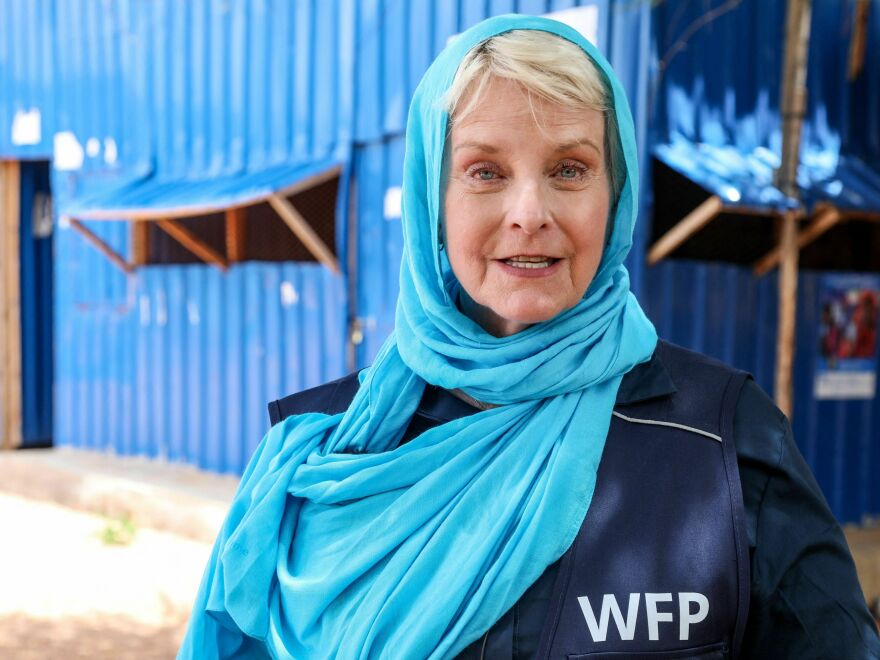The mission of the U.N. World Food Programme is simple: make the world more stable and more peaceful by feeding the hungry.
In recent months, though, it has had to choose between the hungry ... and the starving. That's because of a massive funding shortfall.
Since this spring, fixing that problem has been the responsibility of World Food Programme executive director Cindy McCain.
She spoke to All Things Considered's Mary Louise Kelly about why starvation is a security issue, the stories that stick with her, and where she sees some signs of hope.
This interview has been lightly edited for length and clarity.

Interview highlights
Kelly: Help me understand the severity of the problem. When we say you're being forced to choose between the hungry and the starving, give me an example of where and to what extent you've been forced to reduce food aid.
McCain: Well, I've had to reduce pretty much around the world, quite frankly. To put it succinctly so that it's easy for everyone to understand, for every 1% cut at WFP, this means 400,000 people are pushed further into hunger. That's a sizeable amount and we are down quite a bit of money right now. So our ability to deliver not just emergency food, but sustaining food, has gravely diminished. And consequently, people are not only starving, but they are dying as a result of this.
Kelly: Stay with that number you just gave me. You said for every 1% funding cut that you're wrestling with, 400,000 people go hungry. How many percentage points have you had to cut?
McCain: We're down, my gosh, we've been cut by half right now. So it's quite an amount of money.
Kelly: That's 20 million people.
McCain: Exactly. Exactly. Right now we have about 345 million people that are going hungry in the world. And that's more than the U.S. population total. And so to put it in perspective, that's what we're facing right now.
Kelly: And are we talking about cutting the size of the food ration? Like, how many pounds of flour or rice or whatever? Are we talking about people being cut off from receiving food altogether?
McCain: All of the above. We have cut rations in many cases by half for those that are still eligible. And we've had to cut the rolls of those that are receiving food assistance, in many places just deleting it completely and we can't feed them at all. And so these are tough decisions that I and my team around the world grapple with every day. Because how do you tell a mother and a child that we can't feed them anymore, that are hungry and starving? And that's what we're faced with every day now as a result of this.

Kelly: One country I want to specifically focus you on is Afghanistan, because the WFP just announced you're going to have to drop another 2 million people in that country alone from food assistance. I mean, the political situation there is unstable, to put it mildly. The economy is dire. Life for women keeps getting harder. How will that kind of increased hunger affect life in that country?
McCain: Right now, what it's affecting, these cuts, is primarily affecting women and children, because those are those are our primary recipients within Afghanistan at this point. So we've cut 8 million people in Afghanistan from assistance. And we are going to drop another 2 million very shortly as a result of this. It's a shock. And what it breeds, of course, is instability. It breeds, you know, all the other bad things that can occur in a country that is as unstable as Afghanistan. And that's no good for anybody. Because one thing I want to implore on everyone is that food assistance, starvation, that's a national security issue. It's not just a food security issue. It's national security. And it affects everyone involved, including the United States. Every time I talk about this around the world, I try to implore the fact that food security is safety and it's security for people. And when we can't feed them, we breed instability, unfortunately.
Kelly: You're talking about this on a national security level. I also want to ask about it on a personal level. How does that feel to wake up in the morning and think, it's my job to help these people and I cannot help them?
McCain: It does not feel good. I cannot tell you the amount of sleep I've lost. I knew what I was getting into with this job. I didn't come into it with eyes that didn't understand where we're going. But at this particular level, it's devastating. And so I deal with it every day. It brings a great deal of heartache. And it also breeds in me a great deal of frustration, because I want people to know the absolute impact that this is having on the world. And so I guess from a personal level, I try to keep it in perspective. I try to keep my team in perspective, because they're the ones that are dealing with this on the front lines every day. And we just we have to keep going. That's our job. That's who we are as WFP. We deliver.
Kelly: As you have traveled the world in your months on this job and met people, spent time with people who are on the brink of starving, or watching their kids on the brink of starvation, is there a story, is there someone who will stay with you?
McCain: Oh, I've come across so many people. There was a woman and a couple of children in Somalia that I wound up sitting with for quite a bit of time and talking to in Somalia while I was there in a refugee camp. And she was running from hunger. She was running and trying to find a better place for her family and a better life to be able to feed and educate her children. And the truth of it is, she was probably one of the ones that we wound up cutting because we don't have enough money. And so she stays with me because she left some children behind. She took the most vulnerable children with her. And she walked for almost a month to get to this camp that was just over the border in Somalia. And so those kinds of stories and the looks on their faces are what I'm left with because I can see them. I can see her like it was yesterday, and knowing full well that she wasn't going to be fed properly.
Kelly: Before I let you go, is there any success story, any place you would point us to that gives you hope when you look at it and think, you know what, if we put in the effort, we can really make a positive change.
McCain: Yes, to that. I answer yes, there is. I wouldn't be doing this job if I didn't have hope. So I have to believe that we can fix this and that we can mitigate it so that people won't starve. But again, it's going to take all of us to do it. You know, certain parts, obviously, Africa is in dire strife right now. Of course, we look at Yemen and other places that are just so, so torn on this issue. But there are some success stories, Central America being one of them, working on climate change issue issues and farming, you know, smallholder farmers, things that are really making a difference within their communities. And I'll also talk a little bit about school feeding programs, our cash-based transfers. Those arenas and that part of WFP has been very successful. But again, we just don't have enough.
Copyright 2023 NPR. To see more, visit https://www.npr.org.









